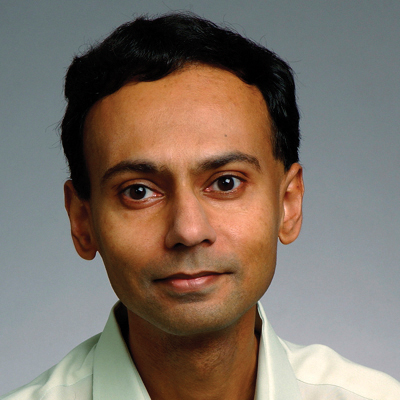Devadas one of four faculty awarded MIT's highest undergraduate teaching award.
Image may be NSFW.
Clik here to view.
Each year, the MacVicar Faculty Fellows Program recognizes professors who exhibit exceptional undergraduate teaching, educational innovation, and mentoring. The awardees this year are Srinivas Devadas, the Edwin Sibley Webster Professor of Electrical Engineering and Computer Science; Jeffrey Grossman, professor of materials science and engineering; Michael Sipser, dean of the School of Science and professor of mathematics; and Patricia Tang, an associate professor of music and theater arts.
Founded in 1992, the program was created to honor the legacy of Margaret MacVicar, an MIT alumna and professor of physical science who served as the Institute’s first dean for undergraduate education, from 1985 to 1990. MacVicar is credited with numerous far-reaching educational initiatives, including the Undergraduate Research Opportunities Program (UROP). Established in 1969 — when MacVicar was just 26 and in her first year on the MIT faculty — UROP has since been emulated worldwide.
The nomination process for the MacVicar awards is rigorous, requiring supporting letters and extensive documentation from several sources, including department heads, faculty, current students, and course evaluations. Provost Martin A. Schmidt selected the fellows, with input from an advisory committee of faculty and students chaired by Dean for Undergraduate Education Dennis M. Freeman. Fellows receive $10,000 annually for 10 years to support their undergraduate teaching. With the addition of the 2016 fellows, the program now sponsors 43 professors.
The Institute will honor the fellows and celebrate excellence in undergraduate education on MacVicar Day, Friday, March 11, with a symposium titled “From Hand to Mind: Advances in Evidence-based Teaching.” Freeman will introduce the 2016 fellows and moderate the panel. Speakers include Martin Culpepper, professor of mechanical engineering; Michael Cuthbert, associate professor of music; David Darmofal, professor of aeronautics and astronautics; Catherine Drennan, professor of biology; Robert Miller, professor of electrical engineering and computer science; and Janet Rankin, interim director of the Teaching and Learning Laboratory.
The symposium will take place from 2 to 4 p.m. in Bartos Theater (Room E15-070), followed by a reception honoring the new MacVicar Fellows from 4 to 5 p.m. in Bartos Lobby. The symposium and reception are open to the entire MIT community.
Srinivas Devedas
Devadas completed a BTech degree in electronics at the Indian Institute of Technology in Madras, India, and earned his MS and PhD in electrical engineering at the University of California at Berkeley. Devadas joined the MIT faculty in 1988, received tenure in 1995, and was promoted to full professor in 1999. He has also served in several leadership roles in the Department of Electrical Engineering and Computer Science (EECS), including associate head and interim head. In 2012, Devadas was named the Edwin Sibley Webster Professor of Electrical Engineering and Computer Science.
“I’m deeply honored to be selected as a MacVicar Faculty Fellow,” Devadas says. “I thank the EECS leadership over my 28 years at MIT for giving me great freedom in choosing my teaching duties and providing me opportunities to teach with, and learn from, literally dozens of my talented colleagues. I am deeply grateful to all my colleagues who I have partnered with in teaching our wonderful students.”
Devadas’ colleagues appreciate partnering with him, as well. “Srini not only was amazing in class, he also was a great mentor to us,” according to one nomination. “His enthusiasm for teaching was inspiring and contagious. He instilled in us and indeed, in all the teaching staff, the idea that one should tirelessly work to improve the material.”
Another colleague cited the many ways Devadas demonstrated “extreme” dedication in a new subject, 6.S04 (Fundamentals of Programming): personally proctoring make-up exams; meeting after hours with undergraduate lab assistants; helping students debug their code in laboratory sessions — “even though we have lab assistants for that!” — and changing his sabbatical plans so he could teach the new subject next year. “And I couldn’t omit the custom 6.S04 frisbees that he had printed, with guinea pigs on them to symbolize the pilot status of the subject, thrown to students who answer questions in lecture!”
Students perceive Devadas as a caring instructor with an inspiring sense of optimism. One noted that Devadas gave him some sage advice before he left MIT for graduate school, “advice that continues to guide me to this day: the best ideas come from a willingness to approach each problem with an enthusiastic outlook. Simply stated, Prof. Devadas is an incredibly positive person and his attitude resonates throughout his teaching every day.”
Another student was struck by the respect Devadas has for students’ needs, such as granting extensions for unforeseen circumstances like illnesses. Devadas’s response, the student wrote, would be “assuaging the student’s concerns and assuring them that they could finish the assignment at their convenience. At a school that is as high-pressure as MIT, such sensitivity goes a long way in ensuring that students don’t get overwhelmed by classwork.”
Read this article on MIT News
News Image:
Clik here to view.
